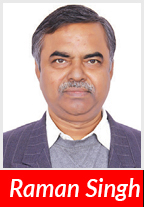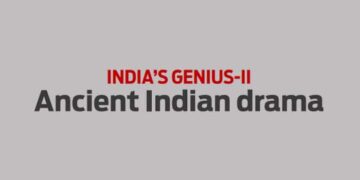 IT is said that of all the arts, the best is drama. Indian and Western art theorists place the dramatic art above all others. The splendid genius and evolution of ancient Indian drama, which reached its consummation in the classical period in the works of Sanskrit dramatists, neither had its origin in, nor was influenced by, the Greek drama. For, contrary to Greek usage, the Indian drama did not either observe the three unities of time, place and action, or bring tragedy onto the stage.
IT is said that of all the arts, the best is drama. Indian and Western art theorists place the dramatic art above all others. The splendid genius and evolution of ancient Indian drama, which reached its consummation in the classical period in the works of Sanskrit dramatists, neither had its origin in, nor was influenced by, the Greek drama. For, contrary to Greek usage, the Indian drama did not either observe the three unities of time, place and action, or bring tragedy onto the stage.
Long before the Greek drama, the love tales of Krishna and gopis, the exploits of Arjuna, the adventures of Rama, and other stories were being ‘properly’ acted.
The dialogue akhyanas and hymns of Rig and Atharva Vedas furnish rudimentary specimens of dramatic art with scope for miming. Dancing and sacrifice, essential parts of Aryan worship, were a kind of religious drama with their prescribed gestures, correctly intoned invocations, and symbolic action. There are references to nataka in Ramayana and Mahabharata.
The Buddhist lore
The earliest ‘known’ historical Sanskrit drama belongs to Buddhist lore, Sariputra-prakarana of Asvaghosha. A set of thirteen plays are attributed to Bhasa, whose masterpieces include Svapna Vasavadatta, Pancharatra, Pratima-nataka, Abhishekanataka. Bharata’s Natyashastra, a Sanskrit treatise on the art of the theatre, predates the Christian era, is an actor’s and a director’s handbook containing all about the art of theatre: five moral stances, sixteen kinds of hero with forty eight varieties, three kinds of situations, heroine standing in eight situations with reference to hero etc.
Europe first learned of Sanskrit drama from Sir William Jones’ translation of Kalidasa’s Abhijanshakuntalam (1789) and from Goethe’s appreciation of it in his famous Elegiacs (1791).
Kalidasa’s another immortal work is Meghadutam (The Cloud Messenger). The American scholar Ryder paid the most eloquent tribute to Kalidasa when he said that the Indian poet understood in the fifth century what Europe did not learn until the nineteenth, and even now comprehends only imperfectly.
Shudraka’s Mrichchhakatika (The Little Clay Cart), though an adaptation of Bhasa’s unfinished Charudatta, is also significant. It does not conform to rules of Indian dramatic poetry, and for this reason is more appreciated in Europe. It is a tender play, a genuine example of pure art theatre and a quintessence of eastern wisdom which lies not in esoteric doctrine but in a tenderness far deeper and truer than that of the traditional Christianity. There is also Visakhadatta’s Mudrarakshasa (The Signet Ring), a purely political play set in the time of Chandragupta Maurya and Chanakya.
Sanskrit and Prakrit
The language of the old plays of Bhasa, Kalidasa, Shudraka and others is mixed, viz. Sanskrit and Prakrit (popular variation of Sanskrit), wherein educated people speak in Sanskrit and ordinary folk, usually women, in Prakrit. This commingling of classic and popular elements bring the plays nearer to the average audience.
Latter-day important Sanskrit dramatists are seventh century AD emperor Harshavardhan, who wrote three plays (Ratnavali, Priyadarsika, Nagananda), Bhavabhuti (MahavirCharita, Uttararama-Charita, and Malati-Madhava), and Rajashekhara. Bhavabhuti’s beauty is chiefly of language; only Kalidasa has precedence over him. It is impossible to conceive language so beautifully musical and grand, as that of the verses of Bhavabhuti and Kalidasa. Indeed Sanskrit drama remains the happiest invention of the Indian genius. According to Sylvan Levi, it may rightly be regarded as the highest product of Indian poetry, and as summing up in itself the final conception of literary art achieved by the very self-conscious creators of Indian literature.














 G20 podium
G20 podium

